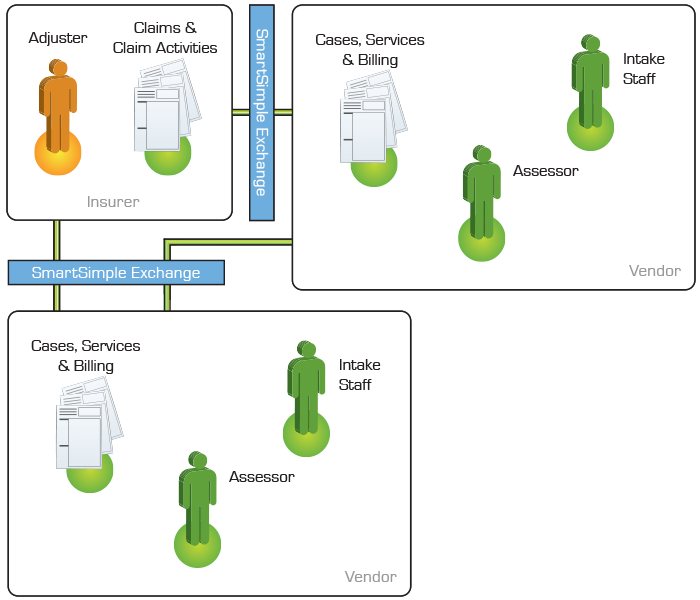Data Exchange Overview
The SmartSimple Data Exchange technique provides a secure method of transferring information between SmartSimple systems. This technique is mostly used to share information between an Insurer and Service Provider (or between Service Providers).
Contents
What are the benefits of Data Exchange?
Support intra-organizational Case Management
More than one organization can participate in the same case, and at the same time retain unique information about the case that is not shared.
Encrypted electronic transmission
- The Data is compressed (to reduce size), encrypted (to ensure confidentiality) and transmitted between SmartSimple systems.
- Secure transmission of medical briefs and Insurer Examination reports saves turnaround time in a regulation imposed and time lined cycle.
What type of Data is transmitted via Data Exchange?
- Claim Information (Level 1 Entity)
- Assessment Information (Level 2 Entity)
- Billing Information (Level 3 Entity)
- Notes associated with the Claim
- Contact
- Attached File and Documents
What is the Data Exchange Technical Protocol?
- User Clicks a button to trigger the process.
- System compresses information to a zip file.
- Encrypted with a key using DES/MD5.
- Post to ONE Target server –https (SSL).
- Recipient server is notified of the New Note or New Package.
- User unpacks the package and new data is Added/Updated on the system.
Note: The export package size limit is 250 MB.
What is the Data Exchange Business Protocol?
Business protocols vary and are implemented as prescribed by the Insurer. Commonly followed business rules include:
- Sender must add a Note before Exporting the Package.
- Uploaded documents must follow the Insurer prescribed naming convention.
How can I track data exchange on a Claim?
You can track the Claim Exchange in following ways:
- Exchange History
- Notes Exchange History
- Incoming Packages
- Exported Packages
How is Data Exchange Configured?
Data Exchange is configured in following steps:
Troubleshooting Data Exchange Issues
Issue: Why am i not able to export the claim to an Insurer?
Resolution: You can only Export a claim that was originally received from the Insurer via Data Exchange.
Issue: I get error when Unpacking a package.
Resolution: See Notes on Unpacking for commonly seen data exchange errors.
